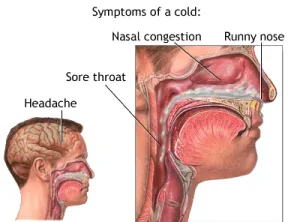Overview
The common cold is a viral infection of the upper respiratory tract, primarily affecting the nose and throat. It is usually mild and self-limiting, resolving within 7–10 days. The infection is caused by several types of viruses, most commonly rhinoviruses, and is highly contagious, spreading through droplets from coughs, sneezes, or direct contact with contaminated surfaces.
Although usually harmless, the common cold can cause discomfort and may lead to complications in people with weakened immune systems or underlying respiratory conditions.
Symptoms
Symptoms of the common cold usually develop gradually and vary in severity.
Common symptoms include:
-
Runny or stuffy nose
-
Sneezing
-
Sore throat
-
Cough
-
Mild headache
-
Fatigue or general malaise
-
Low-grade fever in some cases
-
Watery eyes
-
Mild body aches
Symptoms typically peak within 2–3 days and resolve within a week, though some lingering cough or congestion may persist.
Causes
The common cold is caused by viral infections of the upper respiratory tract.
Key causes include:
-
Rhinoviruses (most common)
-
Coronaviruses (non-COVID types)
-
Respiratory syncytial virus (RSV)
-
Parainfluenza viruses
-
Adenoviruses
The virus spreads through:
-
Airborne droplets from coughs and sneezes
-
Direct contact with contaminated surfaces or hands
-
Close personal contact, such as kissing or handshakes
Risk Factors
Certain factors increase the likelihood of developing a cold:
-
Close contact with infected individuals
-
Weakened immune system
-
Poor hand hygiene
-
Exposure to crowded environments, such as schools or public transport
-
Seasonal changes, especially in fall and winter
-
Stress or fatigue, which may reduce immune response
Complications
The common cold is usually mild, but complications can occur in vulnerable individuals.
Possible complications include:
-
Sinus infections (sinusitis)
-
Ear infections (otitis media)
-
Exacerbation of asthma or chronic respiratory conditions
-
Secondary bacterial infections
-
Severe illness in infants, elderly, or immunocompromised individuals
Prevention
While the common cold cannot be completely prevented, its risk can be reduced through:
-
Frequent handwashing with soap and water
-
Avoiding close contact with infected individuals
-
Avoiding touching the face, especially eyes, nose, and mouth
-
Covering mouth and nose when coughing or sneezing
-
Maintaining a healthy lifestyle to support immune function
-
Disinfecting commonly touched surfaces
Most cases resolve without medical treatment, and supportive care, such as rest, hydration, and over-the-counter remedies, can relieve symptoms.
Advertisement

